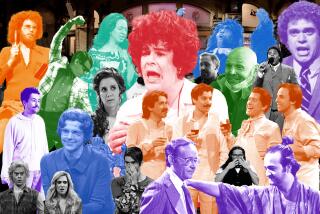It Can Be a Tough Crowd
As the Denver Broncos prepared for the Super Bowl, their game plan didn’t include concerns about offending the vast viewing audience or whether Monica Lewinsky jokes were appropriate.
Yet that’s precisely the balancing act facing the small team of writers charged with injecting some life and laughs into Sunday’s Academy Awards, second only to the Super Bowl among the year’s most-watched annual events.
Bruce Vilanch is by now a veteran signal-caller in this particular game, having overseen “special material” written for the Oscar telecast for the last decade.
“There are certain subjects that are still delicate and tough to do,” Vilanch said, citing President Clinton’s impeachment and his relationship with Lewinsky among them. “But the biggest issue is I think people are dead tired of it. . . . What Lewinsky joke hasn’t been done?”
Because the ceremony traditionally assembles such a huge audience, the Oscars bring in casual TV watchers and sporadic filmgoers as well. Scripting jokes for the show thus poses a unique challenge, as the writers grapple not only with the propriety of topical humor, but playing both to the few thousand film industry insiders within the Dorothy Chandler Pavilion and an anticipated audience of 50 million in the U.S. plus millions more abroad.
Jonathan Macks, a writer for “The Tonight Show With Jay Leno” who is contributing to the upcoming Oscar telecast, noted that in his regular job, one can assume the studio and viewing audiences each represent a cross-current of America. That’s not necessarily the case with the Academy Awards, where some Hollywood jokes may fare better inside the theater.
“The question always is, are you playing to the room, which is [full of] industry people . . . or are you playing to the millions watching out there?” Macks said. “I try to write jokes about the show itself, about trends in the entertainment industry.”
In addition to Vilanch and Macks, the team assigned to the show includes Billy Martin (“Politically Incorrect”) and Dave Boone, another “PI” alumnus who currently works with Vilanch and Oscar host Whoopi Goldberg on the new “Hollywood Squares.”
In terms of topical humor, the writers try to view the year’s events through the prism of what happened within the film business. While they don’t want to fall into the trap of too many inside-Hollywood allusions, the writers do assume the audience possesses a certain knowledge of the film industry’s inner workings, citing expanded consumer coverage that has made executives such as Rupert Murdoch and Michael Ovitz public figures.
Last year’s Oscars presented a large, widely seen target in “Titanic,” the most popular film of all time. The latest ceremony doesn’t include a hit of that magnitude, with “Saving Private Ryan”--a major box-office success, grossing more than $200 million in the U.S. and Canada--the most popular of the best picture nominees.
*
Writers Begin Working Weeks in Advance
The subject matter of the best picture nominees adds another degree of difficulty from a humor standpoint. “Private Ryan” and “The Thin Red Line” both document bloody battles in World War II, while much of the action in the whimsical foreign film “Life Is Beautiful” takes place in a Nazi concentration camp.
“ ‘Titanic’ lent itself to a lot of humor, and there were a lot of people watching the show because of it,” Vilanch noted. “A lot of times you have to joke about what’s going on in the world because the audience hasn’t seen all the movies.”
The writers begin working individually seven to eight weeks before the actual event, talking regularly to Vilanch, who serves as a sort of joke central. They meet occasionally as the show approaches and are stationed backstage throughout the telecast, ready to add, amend or drop material at a moment’s notice depending on what occurs.
“When we’re standing in the wings watching it unfold, we sometimes quickly change what we’re going to do,” Vilanch said.
From that perspective, an offbeat acceptance speech or surprise win is often welcome. Host Billy Crystal feasted for the remainder of the 1992 show off Jack Palance’s famed one-armed push-ups after claiming best supporting actor for “City Slickers,” which Crystal has called “the greatest setup in the history of the Oscars.” Macks noted even an unplanned moment--such as the streaker who raced nude across the stage in 1974--could quickly become fodder for jokes.
“As a producer, you hope that something like that doesn’t happen,” he said. “As a comedy writer, you go, ‘Well, that wouldn’t be that bad.’ ”
Goldberg will be the final arbiter of what jokes she tells, so Macks--who wrote for Crystal but didn’t work with Goldberg on her previous Oscar stints--has watched those shows, in the same way a football coach might study videotape to learn a player’s tendencies.
The writers insist they don’t fret excessively about whether a joke might irritate a segment of the audience, with Vilanch saying it’s virtually inevitable some viewers will be annoyed by something.
“You’re going to rub up against a lot of people, and at some point somebody will be offended,” he said. “You just go in with your eyes open.”
Because of the event’s scale and live nature, many celebrities also remain concerned about trying to be funny, a frustration the writers have bumped up against before. Still, Vilanch said he doesn’t blame stars for being cautious.
“This is something that lives with you for a long time. Ask Sally Field,” he said, referring to her often-quoted 1985 acceptance speech after winning best actress for “Places in the Heart.” “They like her, they really like her.”
More to Read
The complete guide to home viewing
Get Screen Gab for everything about the TV shows and streaming movies everyone’s talking about.
You may occasionally receive promotional content from the Los Angeles Times.






